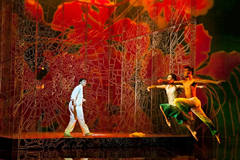| Opera Reviews | 24 April 2024 |
Elegant and charmingby Catriona Graham |
|
| Gluck: Orfeo ed Euridice Scottish Opera March 2015 |
|
|
Gluck’s version of the Greek myth contains ballets as well as a well-known aria – Che faro senza Euridice, so Scottish Opera’s choice of Ashley Page as director pays off. His choreography is elegant and charming and, in the Elysian Fields, sweetly sensual. It is enhanced by the designs of the late Johan Engels – a translucent cube, with angular marble effect, which Mark Jonathan lights black for the tomb, red for Hades and green for Elysium. The cube revolves, changing time, location and mood. Elysium has a gorgeous backdrop of exotic pinky-orange flowers on a green ground. The black-clad ladies of the chorus are in Dior’s New Look, with echoes of Cecil Beaton’s Ascot in My Fair Lady, whereas the men’s hats hint at steam-punk. Steam-punk is more evident in the tatterdemalion red and black costumes of Hades, while the dancing Furies are in red bike-leathers. Their goggles glow, so that, with heads down, they look like bugs. In Elysium, all except Orfeo and Euridice are veiled, with floral wreaths. The final, jolly party when Euridice is restored to Orfeo without condition again echoes that Ascot scene, as the chorus toast the couple with red cocktails. Then there is Amore, a sultry-voiced Ana Quintans, in black v-neck top and deep-pink skirt with large, black polka-dots, mainly Marilyn but with just a hint of Gina Lollobrigida.She first arrives as a splash of colour amongst the mourners, bringing the news that Jove has taken pity on Orfeo and is offering him the chance to win Euridice back. Euridice must be a bit of a thankless part – dying twice, and the rest of the time whingeing because her husband won’t look at her or embrace her. Lucy Hall plays her with the right degree of irritating petulance, while still sounding good in her duet with Orfeo, as they wend their way back home. But it is Orfeo who carries the opera - rarely off-stage and, most of the time, singing of his grief. Caitlin Hulcup is androgynous as the lead singer in a boy-band, in white three-piece suit and silk scarf, a look which works with her mezzo voice. It is rich and expressive, and utterly convincing, as the hapless Orfeo tries to cope with grief, obstructive Lost Souls and Furies, importuning wife and grief again. By the time he is interrupted in the act of slitting his wrists by a resolutely cheerful Amore, he really deserves the break. To complete our pleasure in this production, Gluck’s music may be languorous at times, but not the tempi of conductor Kenneth Montgomery and the orchestra, as it moves towards its inexorably upbeat ending.
|
|
| Text ©
Catriona Graham Photo © K.K. Dundas |

 Misunderstandings are inevitable in relationships, but few have such consequences as Euridice’s. Despite his coming to the Underworld to rescue her from death, she convinces herself that Orfeo no longer loves her and so, with superlative emotional blackmail, inveigles him to look at her, which breaks his vow and loses her to death for ever.
Misunderstandings are inevitable in relationships, but few have such consequences as Euridice’s. Despite his coming to the Underworld to rescue her from death, she convinces herself that Orfeo no longer loves her and so, with superlative emotional blackmail, inveigles him to look at her, which breaks his vow and loses her to death for ever.






